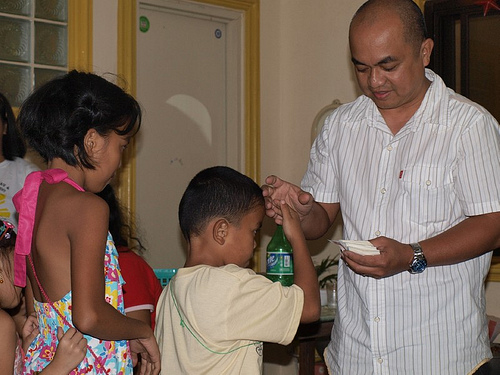Expats’ Guide to being godparents in the Philippines
“Mano po, ninong, mano po, ninang.”
Sounds familiar? You will hear a lot of this phrase as Christmas is fast approaching here in the Philippines. Ninong or Ninang, means godparents in Filipino. But what does a godparent do? Let’s find out.

MANO PO, NINONG. A gesture of respect to elders in the Philippines. Image grabbed from memorykill.tumblr.com
In the Filipino culture, godparenting is a very important aspect in life. Especially that Philippines is a very religious country, godparents are needed in various occasions such as in weddings (sometimes called principal sponsors), baptismal, communion, or confirmation of a child. Being a godparent means you take the role of being a second parent to a child or a couple, being a guide carrying a responsibility to assist them emotionally, spiritually, or even financially.
Getting invited to be a godparent in the Philippines is a truly humbling experience. However, no one should force you to become one, especially if you have a different take on values. As a godparent, your views on religion, spirituality, and morality should be in line with faith. Also, you need to have an interest in the child’s well-being. Also being a godparent means you need to be at the ceremony itself to be a witness to the child or couple’s journey to life.
In the Philippines, it is said that part of a ninong (godfather) or ninang (godmother)’s job is to give gifts to their godchildren during Christmas. This is not necessarily required, but it’s one of the practices during Christmas where children come to their godparents’ house for pamamasko (A Christmas tradition). What’s one event in a year to get to bond with your godchildren and make their Christmas happy, right?
So now, that you know what Ninong or Ninang means, the next time you get asked to become one, are you ready to take on the responsibility? Do you know other responsibilities that being a godparent entails? Comment below.













